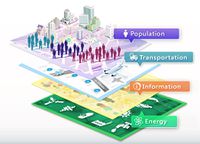Difference between revisions of "Lesson 2"
Jump to navigation
Jump to search
| (7 intermediate revisions by the same user not shown) | |||
| Line 30: | Line 30: | ||
| − | <font size=5>The Evil is in The Data</font> | + | '''<font size=5>The Evil is in The Data</font>''' |
| − | + | = Geospatial Data Models and Modelling= | |
| − | + | ==Representing Real World Geography== | |
| − | |||
* Digital representation | * Digital representation | ||
* The fundamental problem | * The fundamental problem | ||
| Line 41: | Line 40: | ||
* Topology data models | * Topology data models | ||
| − | + | == Georeferencing== | |
* Basic concepts of projections and coordinates | * Basic concepts of projections and coordinates | ||
* Georeferencing | * Georeferencing | ||
* Geocoding | * Geocoding | ||
| − | + | ==Geospatial data modelling== | |
* Geospatial database design | * Geospatial database design | ||
* Spatial Metadata | * Spatial Metadata | ||
| Line 52: | Line 51: | ||
* Multi-user editing and versioning | * Multi-user editing and versioning | ||
| − | + | ==Geospatial Data Repositories== | |
* File-based | * File-based | ||
* Geospatial RDBMS | * Geospatial RDBMS | ||
| Line 58: | Line 57: | ||
| − | = | + | = Readings = |
| − | |||
| − | + | ==Core Readings== | |
| − | + | * [https://mgimond.github.io/Spatial/feature-representation.html Chapter 2 Feature Representation] of '''Intro to GIS and Spatial Analysis''' | |
| + | * [https://mgimond.github.io/Spatial/gis-data-management.html Chapter 3 GIS Data Management] of '''Intro to GIS and Spatial Analysis''' | ||
| + | * [https://mgimond.github.io/Spatial/coordinate-systems.html Chapter 9 Coordinate Systems] of '''Intro to GIS and Spatial Analysis''' | ||
| + | * [http://downloads2.esri.com/support/documentation/ao_/Modeling_our_World.pdf Modeling Our World: The ESRI Guide to Geodatabase Design] | ||
| − | + | ==Additional Readings== | |
| − | + | * [http://en.wikipedia.org/wiki/Map_Projection Map Projection] | |
| − | + | * [http://en.wikipedia.org/wiki/Geocoding Geocoding] | |
| − | |||
| + | == All About QGIS == | ||
| − | + | * [https://docs.qgis.org/3.4/en/docs/gentle_gis_introduction/ A Gentle Introduction to GIS]. Section on Vector Data, Vector Attribute Data, Raster Data, Topology and Coordinates Reference Systems. | |
| − | |||
| − | [ | ||
Latest revision as of 16:20, 15 August 2019
|
|
|
|
|
|
The Evil is in The Data
Contents
Geospatial Data Models and Modelling
Representing Real World Geography
- Digital representation
- The fundamental problem
- The spatial data models
- Topology data models
Georeferencing
- Basic concepts of projections and coordinates
- Georeferencing
- Geocoding
Geospatial data modelling
- Geospatial database design
- Spatial Metadata
- Spatial indexing
- Multi-user editing and versioning
Geospatial Data Repositories
- File-based
- Geospatial RDBMS
- Cloud based geospatial database
Readings
Core Readings
- Chapter 2 Feature Representation of Intro to GIS and Spatial Analysis
- Chapter 3 GIS Data Management of Intro to GIS and Spatial Analysis
- Chapter 9 Coordinate Systems of Intro to GIS and Spatial Analysis
- Modeling Our World: The ESRI Guide to Geodatabase Design
Additional Readings
All About QGIS
- A Gentle Introduction to GIS. Section on Vector Data, Vector Attribute Data, Raster Data, Topology and Coordinates Reference Systems.
